不定代词用法详解
不定代词的用法和区别
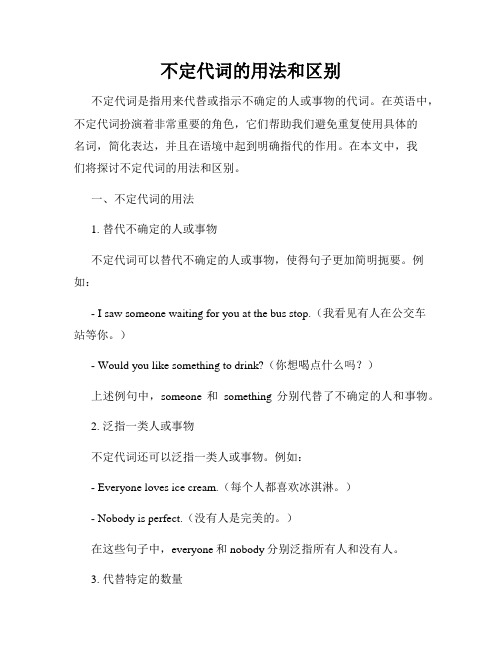
不定代词的用法和区别不定代词是指用来代替或指示不确定的人或事物的代词。
在英语中,不定代词扮演着非常重要的角色,它们帮助我们避免重复使用具体的名词,简化表达,并且在语境中起到明确指代的作用。
在本文中,我们将探讨不定代词的用法和区别。
一、不定代词的用法1. 替代不确定的人或事物不定代词可以替代不确定的人或事物,使得句子更加简明扼要。
例如:- I saw someone waiting for you at the bus stop.(我看见有人在公交车站等你。
)- Would you like something to drink?(你想喝点什么吗?)上述例句中,someone和something分别代替了不确定的人和事物。
2. 泛指一类人或事物不定代词还可以泛指一类人或事物。
例如:- Everyone loves ice cream.(每个人都喜欢冰淇淋。
)- Nobody is perfect.(没有人是完美的。
)在这些句子中,everyone和nobody分别泛指所有人和没有人。
3. 代替特定的数量有时候,我们可以用不定代词来代替特定的数量,使句子更加通用。
例如:- Many have tried, but few have succeeded.(很多人尝试过,但是成功的很少。
)- All are welcome to join the party.(欢迎所有人参加派对。
)在这些句子中,many和few表示一些,all表示所有。
二、不定代词的区别虽然不定代词在替代不确定的人或事物方面是相似的,但它们之间仍存在一些区别。
下面是一些常见的不定代词及其区别:1. somebody和somebody- Somebody told me the news.(有人告诉我这个消息。
)- Anybody can participate in the contest.(任何人都可以参加比赛。
)这两个代词都指不确定的人,但somebody表示肯定意义的“某人”,而anybody则表示否定或疑问意义的“任何人”。
关于不定代词的用法
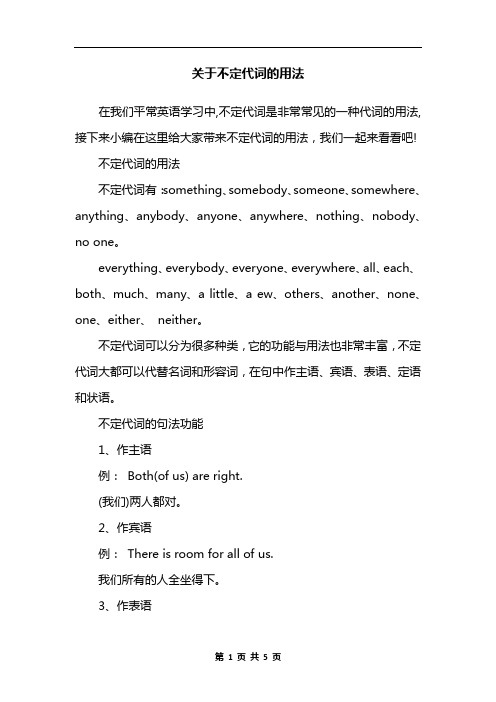
关于不定代词的用法在我们平常英语学习中,不定代词是非常常见的一种代词的用法,接下来小编在这里给大家带来不定代词的用法,我们一起来看看吧!不定代词的用法不定代词有:something、somebody、someone、somewhere、anything、anybody、anyone、anywhere、nothing、nobody、no one。
everything、everybody、everyone、everywhere、all、each、both、much、many、a little、a ew、others、another、none、one、either、neither。
不定代词可以分为很多种类,它的功能与用法也非常丰富,不定代词大都可以代替名词和形容词,在句中作主语、宾语、表语、定语和状语。
不定代词的句法功能1、作主语例:Both(of us) are right.(我们)两人都对。
2、作宾语例:There is room for all of us.我们所有的人全坐得下。
3、作表语例:Thats nothing.没什么。
4、作定语例:You may take either road.两条路你走哪条都行。
向左转|向右转扩展资料1、除every 和no外,不定代词既可用作名词,也可用作形容词。
every和no在句中只能作定语.例如:I have no idea about it.我没有任何主意。
2、all指三者以上,是都的意思。
all的单复数由它所修饰或指代的名词的单复数决定。
例如:All goes well.一切进展得很好。
all 通常不与可数名词单数连用,如:不说all the book,而说the whole book.但all可与表时间的可数名词单数连用,如all day,all night,all the year;但习惯上不说all hour,all century.all还可以与一些特殊的单数名词连用,如all China,all the city,all my life,all the way.3、both都,指两者。
不定代词的用法

不定代词的用法不定代词是指在句中代替不明确或不确定的名词的一类代词。
它们在句子中充当名词的成分,起到代替和指代的作用。
不定代词可以用来表示数量、身份、归属、程度、时间等概念。
在英语中,不定代词有多种形式和用法,本文将对其常见的用法进行探讨。
一、不定代词的形式和用法1. some和anya. some用于肯定句中,表示某种或某些。
b. any用于否定句和疑问句中,表示任何的、任何一种或任何一些。
例句:- Could you give me some water, please?(请给我些水好吗?)- I don't have any money.(我没有一分钱。
)2. all和botha. all用于肯定句中,表示全部或所有的。
b. both用于肯定句中,表示两者都。
例句:- All students must attend the assembly.(所有学生都必须参加集会。
)- Both of them are my friends.(他们两个都是我的朋友。
)3. each和everya. each表示每一个(两者或两者以上的人或事物)。
b. every表示每一个(三个或三个以上的人或事物)。
例句:- Each student should bring their own books.(每位学生应该带自己的书。
)- Every child loves ice cream.(每个孩子都喜欢冰淇淋。
)4. someone和anyonea. someone用于肯定句中,表示某人或有人。
b. anyone用于否定句和疑问句中,表示任何人或任何一人。
例句:- I saw someone waiting for you at the station.(我看到有人在车站等你。
)- Have you seen anyone around here?(你在这附近见过任何人吗?)5. something和anythinga. something用于肯定句中,表示某物或有物。
不定代词的用法
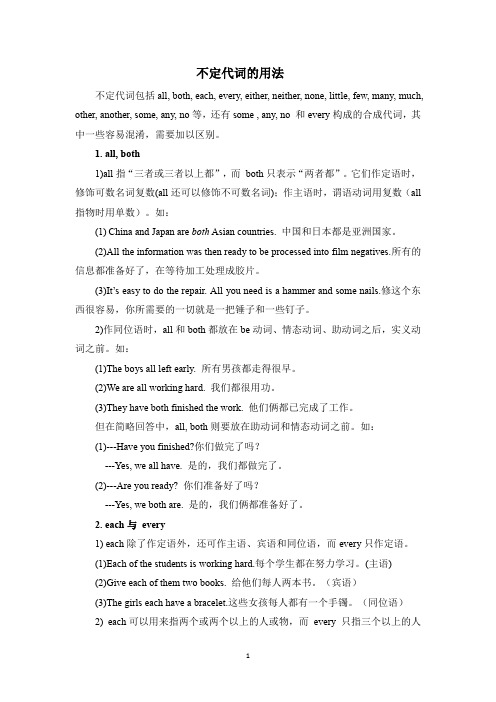
不定代词的用法不定代词包括all, both, each, every, either, neither, none, little, few, many, much, other, another, some, any, no等,还有some , any, no 和every构成的合成代词,其中一些容易混淆,需要加以区别。
1. all, both1)all指“三者或三者以上都”,而both只表示“两者都”。
它们作定语时,修饰可数名词复数(all还可以修饰不可数名词);作主语时,谓语动词用复数(all 指物时用单数)。
如:(1)China and Japan are both Asian countries. 中国和日本都是亚洲国家。
(2)All the information was then ready to be processed into film negatives.所有的信息都准备好了,在等待加工处理成胶片。
(3)It’s easy to do the repair. All you need is a hammer and some nails.修这个东西很容易,你所需要的一切就是一把锤子和一些钉子。
2)作同位语时,all和both都放在be动词、情态动词、助动词之后,实义动词之前。
如:(1)The boys all left early. 所有男孩都走得很早。
(2)We are all working hard. 我们都很用功。
(3)They have both finished the work. 他们俩都已完成了工作。
但在简略回答中,all, both则要放在助动词和情态动词之前。
如:(1)---Have you finished?你们做完了吗?---Yes, we all have. 是的,我们都做完了。
(2)---Are you ready? 你们准备好了吗?---Yes, we both are. 是的,我们俩都准备好了。
不定代词的用法
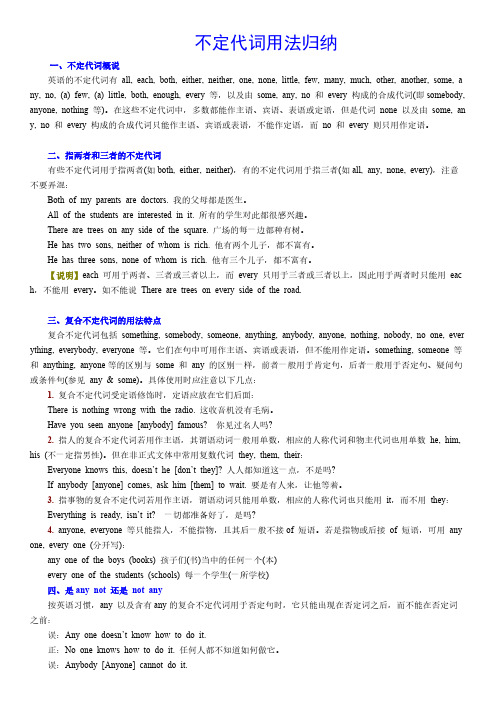
不定代词用法归纳一、不定代词概说英语的不定代词有all, each, both, either, neither, one, none, little, few, many, much, other, another, some, a ny, no, (a) few, (a) little, both, enough, every 等,以及由some, any, no 和every 构成的合成代词(即somebody, anyone, nothing 等)。
在这些不定代词中,多数都能作主语、宾语、表语或定语,但是代词none 以及由some, an y, no 和every 构成的合成代词只能作主语、宾语或表语,不能作定语,而no 和every 则只用作定语。
二、指两者和三者的不定代词有些不定代词用于指两者(如both, either, neither),有的不定代词用于指三者(如all, any, none, every),注意不要弄混:Both of my parents are doctors. 我的父母都是医生。
All of the students are interested in it. 所有的学生对此都很感兴趣。
There are trees on any side of the square. 广场的每一边都种有树。
He has two sons, neither of whom is rich. 他有两个儿子,都不富有。
He has three sons, none of whom is rich. 他有三个儿子,都不富有。
【说明】each 可用于两者、三者或三者以上,而every 只用于三者或三者以上,因此用于两者时只能用eac h,不能用every。
如不能说There are trees on every side of the road.三、复合不定代词的用法特点复合不定代词包括something, somebody, someone, anything, anybody, anyone, nothing, nobody, no one, ever ything, everybody, everyone 等。
不定代词用法总结
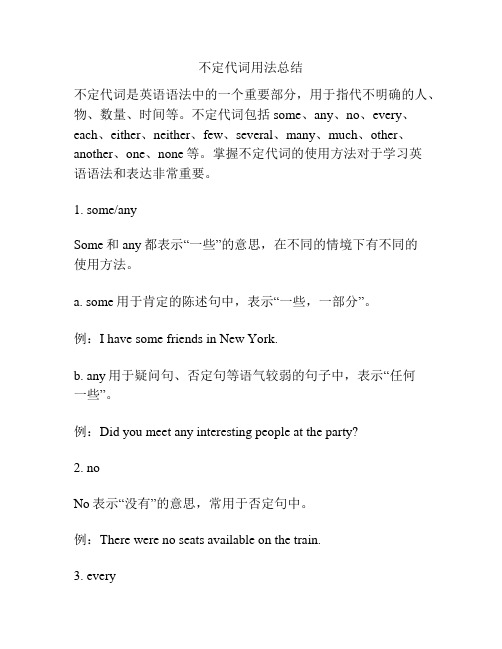
不定代词用法总结不定代词是英语语法中的一个重要部分,用于指代不明确的人、物、数量、时间等。
不定代词包括some、any、no、every、each、either、neither、few、several、many、much、other、another、one、none等。
掌握不定代词的使用方法对于学习英语语法和表达非常重要。
1. some/anySome和any都表示“一些”的意思,在不同的情境下有不同的使用方法。
a. some用于肯定的陈述句中,表示“一些,一部分”。
例:I have some friends in New York.b. any用于疑问句、否定句等语气较弱的句子中,表示“任何一些”。
例:Did you meet any interesting people at the party?2. noNo表示“没有”的意思,常用于否定句中。
例:There were no seats available on the train.3. everyEvery表示“每一个”的意思。
例:Every student is required to attend the meeting.4. eachEach表示“每一个”,用于强调个体。
例:Each student is responsible for his or her own progress.5. either/neitherEither表示“两者中的任何一个”,neither表示“两者都不”。
例:You can choose either the blue or the red dress.例:Neither of us likes to cook.6. few/several/many/much这些代词都用于表示数量或程度。
a. few表示“很少,几乎没有”。
例:There were few people in the park on such a hot day.b. several表示“几个,若干”。
不定代词的用法归纳
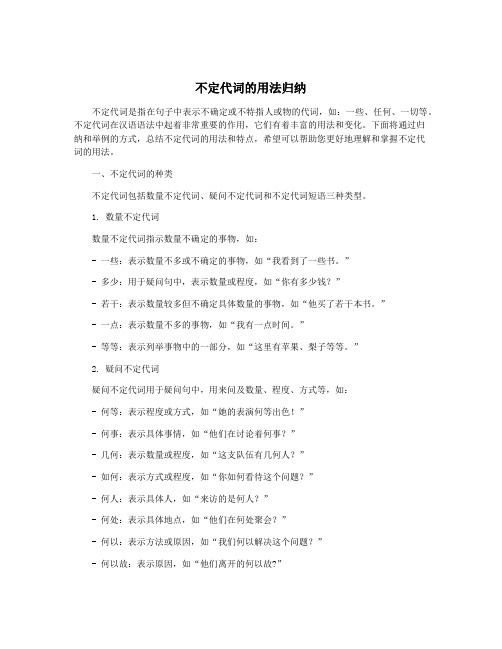
不定代词的用法归纳不定代词是指在句子中表示不确定或不特指人或物的代词,如:一些、任何、一切等。
不定代词在汉语语法中起着非常重要的作用,它们有着丰富的用法和变化。
下面将通过归纳和举例的方式,总结不定代词的用法和特点,希望可以帮助您更好地理解和掌握不定代词的用法。
一、不定代词的种类不定代词包括数量不定代词、疑问不定代词和不定代词短语三种类型。
1. 数量不定代词数量不定代词指示数量不确定的事物,如:- 一些:表示数量不多或不确定的事物,如“我看到了一些书。
”- 多少:用于疑问句中,表示数量或程度,如“你有多少钱?”- 若干:表示数量较多但不确定具体数量的事物,如“他买了若干本书。
”- 一点:表示数量不多的事物,如“我有一点时间。
”- 等等:表示列举事物中的一部分,如“这里有苹果、梨子等等。
”2. 疑问不定代词疑问不定代词用于疑问句中,用来问及数量、程度、方式等,如:- 何等:表示程度或方式,如“她的表演何等出色!”- 何事:表示具体事情,如“他们在讨论着何事?”- 几何:表示数量或程度,如“这支队伍有几何人?”- 如何:表示方式或程度,如“你如何看待这个问题?”- 何人:表示具体人,如“来访的是何人?”- 何处:表示具体地点,如“他们在何处聚会?”- 何以:表示方法或原因,如“我们何以解决这个问题?”- 何以故:表示原因,如“他们离开的何以故?”3. 不定代词短语不定代词短语是由一个或多个词组成的不定代词,如:- 有的(少数):表示有一部分事物,如“有的学生不喜欢数学。
”- 无论(不分别):表示两者都一样,如“无论贫富,人生都应该平等。
” - 也许(或许):表示可能性,如“也许他今天会来。
”- 可能(或许):表示可能性,如“他可能迟到了。
”- 不论(无论):表示两者都一样,如“不论去哪里,我都会支持你。
”二、不定代词的用法1. 作主语不定代词可以作为句子的主语来表示不定的人或物,如:- 任何人都可以报名参加。
不定代词用法
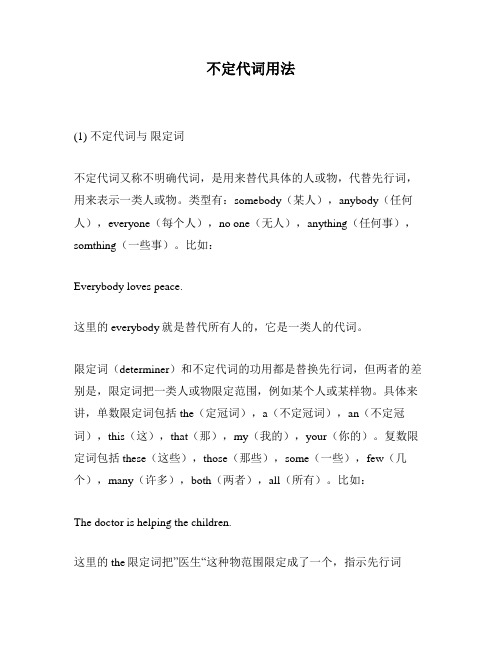
不定代词用法(1) 不定代词与限定词不定代词又称不明确代词,是用来替代具体的人或物,代替先行词,用来表示一类人或物。
类型有:somebody(某人),anybody(任何人),everyone(每个人),no one(无人),anything(任何事),somthing(一些事)。
比如:Everybody loves peace.这里的everybody就是替代所有人的,它是一类人的代词。
限定词(determiner)和不定代词的功用都是替换先行词,但两者的差别是,限定词把一类人或物限定范围,例如某个人或某样物。
具体来讲,单数限定词包括 the(定冠词),a(不定冠词),an(不定冠词),this(这),that(那),my(我的),your(你的)。
复数限定词包括these(这些),those(那些),some(一些),few(几个),many(许多),both(两者),all(所有)。
比如:The doctor is helping the children.这里的the限定词把”医生“这种物范围限定成了一个,指示先行词doctor指代的是一位具体的人,而不是一类人,一类物。
(2) 不定代词与名词不定代词常常紧跟名词一起构成短语,表示一类或多类先行词。
有时不定代词替代先行词中的名词,有时又用作补充,在名词和形容词之间,用来确定这个名词指代什么。
比如:Give me something to read.这句话的something就是一类人或物的不定代词,来补充表示具体的读物,而不是吃物或看物。
(3) 不定代词与名词性短语不定代词与名词性短语在句子中也有不同的用法,例如:He has something to say.这里的something就是一类人或物的不定代词,来补充表示”要说的“,而不是具体的内容。
(4) 不定代词与不定式不定代词也可以和不定式一起构成短语,表示一类或多类的动作,主要有something to do,something to think,something to say等,比如:He has something to do.这里的something就是一类人或物的不定代词,来补充表示”要做的“,而不是具体的事情。
不定代词用法

e.g: 1)He looked for his pen everywhere . 2) This summer he stayed at home or go nowhere .
训练场
1、She looked inside the box, but she saw__D___ in it .
e.g : 1) Someone is knocking at the door, isn’t he / aren’t
they ?
2) There, everything goes well , doesn’t it ?
6、复合不定代词作主语时,谓语动词必须用单数形 式。
e.g : 1) Everything begins to grow in spring. 2) There is something new in today’s newspaper .
Your penfriend,
Sun Xiaoli
A. Can it B. can’t it C. can they D. can’t they
4、We must find_A_____ to do the work .
A. Somebody careful B. careful nobody
C. Nobody careful
D. careful somebody
No . The table hasn’t been set yet .
A. Anything B. everything C.nothing D. something
作 文 点 评(范文)
Dear Emily, I'm sorry to hear that you are ill again. My mom often tells something about how to stay healthy. I will tell you what she tells me. She often says, “Drink more milk and water.”She asks me to eat more fruit and vegetables. She says that I should eat vegetables at least three times a day . She also encourages me to go outside and play . I like to play basketball with my friends. Maybe you could do the same. I think my mom's advice is good . Maybe you can try the same and see if it helps. I hope you get well soon .
不定代词的用法

不定代词的用法1. some,any(1) some多用于肯定句,修饰复数可数名词和不可数名词,作“一些”解。
它还可修饰单数可数名词,作“某一”解。
如:H-5 avian influenza first broke out in some Asian countries.H-5型禽流感首先在亚洲爆发。
Some people are early risers. 有些人起得很早。
(2) any通常用于否定句、疑问句或条件句,修饰单数或复数可数名词以及不可数名词。
If there are any new magazines in the library, take some for me.图书馆如果来了新杂志,替我借几本。
Are there any stamps in the drawer? 抽屉里有邮票吗?Is there any money with you? 你身上带钱了吗?(3) any还可以用于肯定句,作“任何的”解。
You can come here any time. 你什么时候来都行。
You can get it at any shop. 你可以在任何一家商店买到它。
2. either,both,all(1) either表示“两者中的任何一个”。
Either of the brothers is selfish. 两兄弟都非常自私。
Either will do. 两个都行。
(2) both“两个都”,修饰可数名词,统指两者。
Tom and Jack both made some progress. 汤姆和杰克两个都有所进步。
Both of them should make concessions. 他们双方都应做出让步。
(3) all“全部,所有的”,修饰可数名词和不可数名词,指两个以上的人或物。
All the students contributed to the fund.所有的学生都为基金会捐了款。
不定代词的用法总结
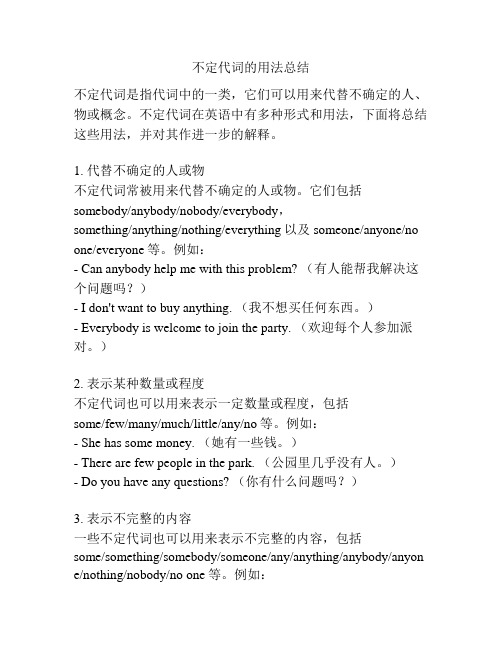
不定代词的用法总结不定代词是指代词中的一类,它们可以用来代替不确定的人、物或概念。
不定代词在英语中有多种形式和用法,下面将总结这些用法,并对其作进一步的解释。
1. 代替不确定的人或物不定代词常被用来代替不确定的人或物。
它们包括somebody/anybody/nobody/everybody,something/anything/nothing/everything以及someone/anyone/no one/everyone等。
例如:- Can anybody help me with this problem? (有人能帮我解决这个问题吗?)- I don't want to buy anything. (我不想买任何东西。
)- Everybody is welcome to join the party. (欢迎每个人参加派对。
)2. 表示某种数量或程度不定代词也可以用来表示一定数量或程度,包括some/few/many/much/little/any/no等。
例如:- She has some money. (她有一些钱。
)- There are few people in the park. (公园里几乎没有人。
)- Do you have any questions? (你有什么问题吗?)3. 表示不完整的内容一些不定代词也可以用来表示不完整的内容,包括some/something/somebody/someone/any/anything/anybody/anyon e/nothing/nobody/no one等。
例如:- I have something to tell you. (我有件事要告诉你。
)- Is there anyone who can help me? (有人可以帮帮我吗?)- She knows nothing about it. (她对此一无所知。
不定代词的用法归纳
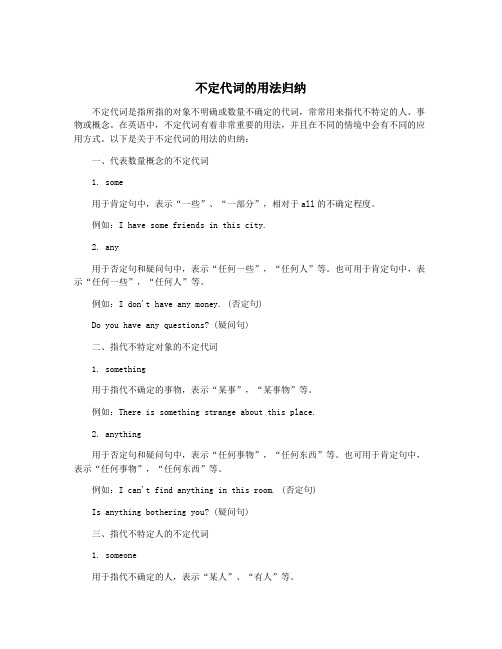
不定代词的用法归纳不定代词是指所指的对象不明确或数量不确定的代词,常常用来指代不特定的人、事物或概念。
在英语中,不定代词有着非常重要的用法,并且在不同的情境中会有不同的应用方式。
以下是关于不定代词的用法的归纳:一、代表数量概念的不定代词1. some用于肯定句中,表示“一些”、“一部分”,相对于all的不确定程度。
例如:I have some friends in this city.2. any用于否定句和疑问句中,表示“任何一些”,“任何人”等。
也可用于肯定句中,表示“任何一些”,“任何人”等。
例如:I don't have any money. (否定句)Do you have any questions? (疑问句)二、指代不特定对象的不定代词1. something用于指代不确定的事物,表示“某事”,“某事物”等。
例如:There is something strange about this place.2. anything用于否定句和疑问句中,表示“任何事物”,“任何东西”等。
也可用于肯定句中,表示“任何事物”,“任何东西”等。
例如:I can't find anything in this room. (否定句)Is anything bothering you? (疑问句)三、指代不特定人的不定代词1. someone用于指代不确定的人,表示“某人”、“有人”等。
例如:I saw someone waiting for you outside.2. anyone用于否定句和疑问句中,表示“任何人”,“任何人物”等。
也可用于肯定句中,表示“任何人”,“任何人物”等。
例如:I don't want to talk to anyone right now. (否定句)Has anyone called for me? (疑问句)四、表示不定数量或程度的不定代词1. much用于肯定句和否定句中,表示“很多”,“大量”等。
不定代词用法详解

不定代词用法详解不定代词,不明确指代某个特定的人或事物的代词叫不定代词。
不定代词可以代替名次和形容词,表示不同的数量概念。
不定代词没有主格和宾格之分,在句中可做主语、宾语、表语、定语等。
英语中的不定代词常常成对出现,如 some 和 any, all 和 both, neither和either, each 和 every, other和another, much和many, one和no, none和no one, few和 a few,little和a little ,等等。
另外,还有由some, any, every, no 与 body, one, thing 构成的复合不定代词(somebody, anybody, everybody, nobody, someone, anyone, everyone, no one, something, anything, everything, nothing) 。
1. some 和 anysome 和 any 都可修饰或指代可数名词和不可数名词;some 一般用于肯定句,any 一般用于疑问句和否定句。
如:I must get some fruit in the market. Do you have any books for children?我得在市场上买点水果。
你有适合小孩子看的书吗?【说明】(1)当表示请求或要求并希望对方能给出肯定的回答时,some也可用于疑问句;any 表示“任何的”之意时,也可用于肯定句。
Can you give me some paper?你能给我些纸吗?Why not send that girl some flowers?为什么不送给那位女孩几束花呢?You can read any of the books.你可以看这些书中的任何一本。
(2)some 和 any 均不能跟冠词连用。
2.all 和 both(1) all 表示全部,表示三者或三者以上的人或物;both 指代两个人或事物,表示两者都。
不定代词的用法
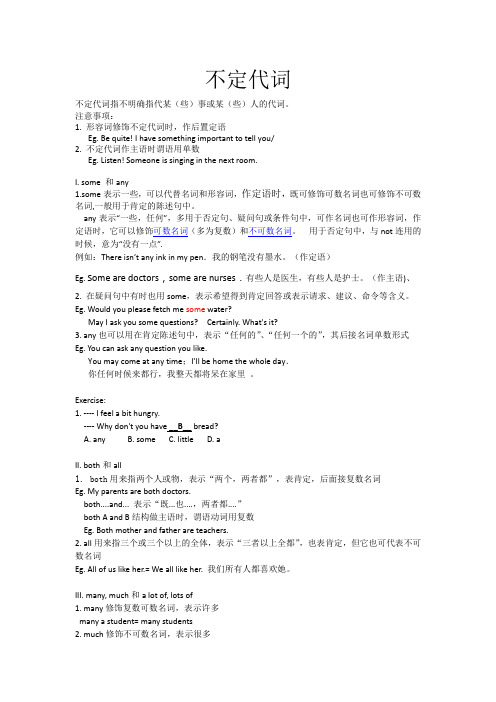
不定代词不定代词指不明确指代某(些)事或某(些)人的代词。
注意事项:1. 形容词修饰不定代词时,作后置定语Eg. Be quite! I have something important to tell you/2. 不定代词作主语时谓语用单数Eg. Listen! Someone is singing in the next room.I. some 和any1.some表示一些,可以代替名词和形容词,作定语时,既可修饰可数名词也可修饰不可数名词,一般用于肯定的陈述句中。
any表示“一些,任何”,多用于否定句、疑问句或条件句中,可作名词也可作形容词,作定语时,它可以修饰可数名词(多为复数)和不可数名词。
用于否定句中,与not连用的时候,意为“没有一点”.例如:T here isn’t any ink in my pen.我的钢笔没有墨水。
(作定语)Eg. Some are doctors,some are nurses.有些人是医生,有些人是护士。
(作主语)、2. 在疑问句中有时也用some,表示希望得到肯定回答或表示请求、建议、命令等含义。
Eg. Would you please fetch me some water?May I ask you some questions? Certainly. What's it?3. any也可以用在肯定陈述句中,表示“任何的”、“任何一个的”,其后接名词单数形式Eg. You can ask any question you like.You may come at any time;I’ll be home the whole day.你任何时候来都行,我整天都将呆在家里。
Exercise:1. ---- I feel a bit hungry.---- Why don't you have __B__ bread?A. anyB. someC. littleD. aII. both和all1. both用来指两个人或物,表示“两个,两者都”,表肯定,后面接复数名词Eg. My parents are both doctors.both....and... 表示“既...也....,两者都....”both A and B结构做主语时,谓语动词用复数Eg. Both mother and father are teachers.2. all用来指三个或三个以上的全体,表示“三者以上全都”,也表肯定,但它也可代表不可数名词Eg. All of us like her.= We all like her. 我们所有人都喜欢她。
(完整版)不定代词用法小结

一、不定代词概说英语的不定代词有 all, each, both, either, neither, one, none, little, few, many, much, other, another, some, any, no, (a) few, (a) little, both, enough, every 等,以及由 some, a ny, no 和 every 构成的合成代词(即somebody, anyone, nothing 等)。
在这些不定代词中,多数都能作主语、宾语、表语或定语,但是代词 none 以及由 some, any, no 和 every 构成的合成代词只能作主语、宾语或表语,不能作定语,而 no 和 every 则只用作定语。
二、指两者和三者的不定代词有些不定代词用于指两者(如both, either, neither),有的不定代词用于指三者(如all, any, n one, every),注意不要弄混:Both of my parents are doctors. 我的父母都是医生。
All of the students are interested in it。
所有的学生对此都很感兴趣.There are trees on any side of the square. 广场的每一边都种有树.He has two sons, neither of whom is rich. 他有两个儿子,都不富有。
He has three sons, none of whom is rich。
他有三个儿子,都不富有。
【说明】each 可用于两者、三者或三者以上,而 every 只用于三者或三者以上,因此用于两者时只能用 each,不能用 every.如不能说 There are trees on every side of the road.三、复合不定代词的用法特点复合不定代词包括 something, somebody, someone, anything, anybody, anyone, nothing, nobo dy, no one, everything, everybody, everyone 等。
不定代词用法
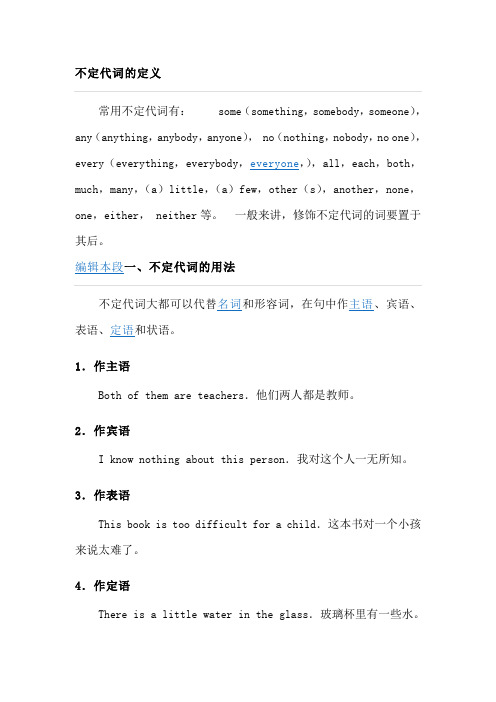
不定代词的定义常用不定代词有:some(something,somebody,someone),any(anything,anybody,anyone), no(nothing,nobody,no one),every(everything,everybody,everyone,),all,each,both,much,many,(a)little,(a)few,other(s),another,none,one,either, neither等。
一般来讲,修饰不定代词的词要置于其后。
编辑本段一、不定代词的用法不定代词大都可以代替名词和形容词,在句中作主语、宾语、表语、定语和状语。
1.作主语Both of them are teachers.他们两人都是教师。
2.作宾语I know nothing about this person.我对这个人一无所知。
3.作表语This book is too difficult for a child.这本书对一个小孩来说太难了。
4.作定语There is a little water in the glass.玻璃杯里有一些水。
5.作状语I can't find my book anywhere.我在任何地方都不能找到我的书。
修饰不定代词的词,一般情况下要后置.编辑本段二、常用不定代词用法举例一般不定代词用法例子1.some 一些,某些,某个不定代词some可以代替名词和形容词,常用在肯定句中作主语、宾语、定语等。
作定语时,它可以修饰可数名词(单、复数皆可)和不可数名词。
例如:some are doctors,some are nurses.有些人是医生,有些人是护士。
(作主语)2.any一些,任何不定代词any可以代替名词和形容词,常用在否定句或疑问句中作主语、宾语、定语等。
作定语时,它可以修饰可数名词(多为复数)和不可数名词。
例如:there isn’t any ink in my pen.我的钢笔没有墨水。
英语不定代词的简单用法

英语不定代词的简单用法英语不定代词的简单用法导语:不定代词即不指明代替任何特定名词或形容词的代词。
下面YJBYS店铺讲解不定代词的用法,欢迎参考!1. 不定代词概说先说说什么叫不定代词。
所谓“不定”,就是“不确定”“不明确”的意思,所以不定代词就是指不明确表示代替某特定名词或形容词的代词,如someone意为“某人”,something意为“某事”或“某物”,many表示“许多人”或“许多物”,a few表示“几个人”或“几个事物”,等等。
英语的不定代词很多,如some, any, all, each, both, either, neither, one, none, many, much, other, another, no, (a) few, (a) little, enough, every 等,以及由 some, any, no 和 every 构成的复合不定代词(如somebody, anyone, nothing 等)。
2. some与any一般说来,some 用于肯定句中,any 用于否定句、疑问句和条件句中。
如:肯定句:He asked some questions. 他问了一些问题。
否定句:He didn’t ask any questions. 他没有问任何问题。
疑问句:Did he ask any questions? 他问了些问题没有?但是,在表示请求、邀请或征求意见的句子中,通常要用some 而不用any。
如:Shall I get some for you? 要我帮你拿些来吗?Since you have plenty of them, why not give her some? 既然你有那么多,为什么不给她一些呢?any 有时也用于肯定句中,表示“任何”的意思。
如:Any of these may suit you. 这些中间的任何一个都可能适合你。
另外,还有一点要特别注意,汉语可说“任何……都不”,但英语不能说any…not。
不定代词的用法大全

不定代词的⽤法⼤全不定代词的⽤法,在⼩学、初中和⾼中三个阶段的考试中,都会考查到,⽽不定代词的内容⼜较为繁杂,所以今天就跟⼤家来梳理⼀下。
⼀、定义不定代词是指⽤来指代特定名词或形容词的的代词,但这类代词所指代的⼈或物是不特定的。
如“some men”,⼀些⼈,短语中的不定代词some只是⽤来指代某些⼈,但没有明确指明是哪些⼈。
⼆、分类不定代词主要分为三类:合成不定代词;兼作代词的限定词;不能兼作代词的限定词。
(⼀)合成不定代词这类不定代词⼜叫复合不定代词,主要是由every、some、any和no分别与body、one和thing所构成的12个不定代词。
他们是:everybody, everyone, everything;somebody, someone, something;anybody, anyone, anything;nobody, no one, nothing。
其中,⽐较特别的是no one,需要注意跟none的区别,本⽂后⾯会说到两者的区别。
(⼆)兼作代词的限定词这类词之所以被称作兼作代词的限定词,是因为它们除了可以作代词外,还可以⽤作形容词、副词或名词等。
这类词主要有:all,any,both,each,either, neither,none, (a) few,(a)little,many,much,another, other, others, some。
(三)不能兼作代词的限定词这类词⼀般不能直接作为代词独⽴在句中充当句⼦成分,这类词主要有every和no。
三、句法功能1、作主语Everyone is at the party now.Both of them like the dress.【注意】every和no不能作主语。
2、作宾语I don't like anyone of them.If you have any, give us some.【注意】every和no不能作宾语。
- 1、下载文档前请自行甄别文档内容的完整性,平台不提供额外的编辑、内容补充、找答案等附加服务。
- 2、"仅部分预览"的文档,不可在线预览部分如存在完整性等问题,可反馈申请退款(可完整预览的文档不适用该条件!)。
- 3、如文档侵犯您的权益,请联系客服反馈,我们会尽快为您处理(人工客服工作时间:9:00-18:30)。
不定代词用法总结1) some, any的用法some和any通常用于表示不定数或不定量,修饰复数可数名词或不可数名词。
some 表示“几个;一些;部分”,多用于肯定句;而any表示“一些;什么;任何;”,对用于否定句或疑问句中。
如:* He asked me some questions. (他问了我几个问题。
) * Some of the bread has been eaten. (面包已吃了一些。
)* Are there any stamps in this post office? (这个邮局里有邮票吗?)* I didn’t have any cigarettes, so I went out to buy some. (我没有香烟了,所以出去买了一些。
)2) 复合不定代词的用法a. 不定代词some, any, no与-one, -body, -thing可以组成九个复合代词。
它们是:someone anyone no onesomebody anybody nobodysomething anything nothing这些复合不定代词只有名词的性质,可以作主语、宾语等。
b. 因为some一般用于肯定句,any一般用于否定句或疑问句,no表示完全否定,因此由some, any, no与-one, -body组成的复合代词的用法也一样。
c. 第二部分为-one和-body的复合代词只用于表示人,它们的形式是单数形式,但有时可以用they或them指代。
* There is someone in your office. Can you hear them talking? (你办公室里有人。
你听见他们说话了吗?)d. 第二部分为-thing的复合代词只能用于指物。
如:* There was something wrong with the car so he had to stopped it.* He looked at me and didn’t say anything. * Nothing can be done to save her life.e. 这些复合不定代词如果有其它的形容词修饰,形容词必须后置。
如:* Somebody important has arrived, I’m sure. (important修饰somebody)3) none 与no one 的用法区别None和no one 都表示“三者或者三者以上的另一个”,但是用法不一样。
None既指人也指物,它常与of 短语连用None of us failed the exam.I have read none of the books.在回答以how many,how much 开头得疑问句时要用none。
No one 只能用来指人,不能指物,且不能与of短语连用,回答以who开头的疑问句时要用no one。
No one knows the answer to the question.4) all, every, each, other, another, either, neither, botha. every只有形容词的性质,在句中作定语。
常用于修饰单数的可数名词。
表示“每个;各个”,还可以表示“一切”。
* After the strong wind every flower in the garden was gone.every还可以和-one, -thing, -body构成复合不定代词,即:everyone, everything, everybody。
其中,everyone和everybody用于指人,意思一样,都是“每人;大家”,形式上表示单数意思上可以表示单数也可以表示复数。
everything用于指物,意思是“每件事;一切”,形式上表示单数意思上可以表示单数也可以表示复数。
如:* One can’t have everything. * Everything goes well with me.* The town is so small that everybody knows everybody else.注意:在使用everyone时要注意和every one相区别。
everyone是一个不定代词而every one是一个词组,前者只能指人而后者既可以指人也可以指物。
请注意下列例句:* Everyone will be here except Patrick. (everyone 指人) * Every one of the children will get a gift. (every one也指人)*We played several matches against the visitors, but unluckily lost every one. (every one指物)b. each的意思是“每个;各自的”,可以指人,也可以指物。
如:* I leave home at 7 a.m. each day. * Each of them has received a letter.由于each和every的意思相近,都表示“每一个”,因此要特别注意它们的区别。
each所描述的对象至少是两个数目中的每一个,而every所描述的对象至少是三个数目中的每一个;every 着重强调整体的含义而each 着重强调个别;every 只能作形容词放于名词前而each 可以作形容词、代词和副词。
如:*You can see a lot of new shops on each side of the street. (因为街道只有两边因此不能用every)*Each has too coats. (each 是代词不能换用every)c. other 可以指人也可以指物,表示“另外的人或事物”,其后可以接单数或复数的名词;此外,other 也有复数形式,是others 。
如:* He has two brothers, one is a teacher, the other is a doctor.*Some children like milk chocolate, other children prefer plain chocolate.*We should not think only of ourselves, we should think of others first.d. another 的意思是“另一个;再一个;又一个”,通常只能修饰单数的名词或代词,泛指“不定数目中的另一个”。
* Would you like to try another kind of drink? * I don't like this hat; pleaseshow me another.注意:other 和another 都有“另外的”意思,要注意它们的区别。
首先一般来说,两者中的“另一个”是the other ,不定数目中的“另一个”是another 。
如:* She has a book in one hand and a pen in the other. (这里表示两只手中的另一个因此用the other)* This cup is broken. Get me another, please.其次,other 的后面可以接单数或复数的名词而another 的后面只能接单数名词。
如:* He has other brothers. * I am not very well today. Tell them I will go and seethem another day.第三,other 有复数形式,泛指别人时通常不加冠词;而表示其他的人时常要加定冠词;而another 没有复数形式。
* Some went to the People’s Park, others visited the zoo. * Could you tell theothers that I’ll be late?(每一个人都知道应该做什么/他的工作。
) (在这两个句子中用every 和each 都可以)5) many, much, few, little, a few, a little, a lot of, lots of 这些词都可以用来表示数量,但它们的用法也应当注意。
a. many和much 这两个词都表示“许多;大量”,它们的比较级和最高级是more和most。
它们的不同在于:many只能指代或修饰可数名词的复数,much一般只能指代或修饰不可数名词。
如:* “Do you have any books on English grammar?” “Yes, but not many.” (这里的many指代上文的books)* Much time will be saved if you plan your work very well. (time是不可数名词,因此用much)b. (a) few和(a) little a few和a little是一对用作表示数量的不定代词的固定词组,它们具有名词和形容词的性质,它们的意思是“少数;少量”,都表示肯定的意思。
它们的不同点是:a few指代或修饰可数名词的复数,a little指代或修饰不可数名词。
如:* Only a few of the children in this village can read. (因为children是可数名词的复数因此用a few)* There was a little rain just now and the air is fresh now. (rain是不可数名词因此要用a little)few和little表示否定,意思是“几乎一点没有”,相当于not … many或not …much。
和a few和a little一样,few指代或修饰可数名词的复数而little指代或修饰不可数名词指代或修饰不可数名词。
如:* Few visitors enjoyed the trip to London. (few修饰的是可数名词visitors)* There is little to be done about it. (关于这件事没有什么可做的了。
) (little指代索要做的事情)few的比较级和最高级是:fewer,fewest;little的比较级和最高级是:less,least。
c. a lot of和lots of这两个词组的意思都是“大量的;许多的”,后面既修饰能可数名词复数也能修饰不可数名词,可以代替many和much使用。
